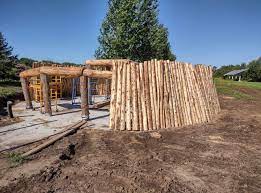|
Rebecca Gonzalez-Campoy, Beloved Community Communications Team and Indigenous Justice Ministry Team  Makoce Ikikcupi - Mountain Lake Makoce Ikikcupi - Mountain Lake We stand on the homelands of the Dakota Nation. We honor with gratitude the people who have stewarded the land throughout the generations and their ongoing contributions to this region. We acknowledge the ongoing injustices that we have committed against the Dakota and Ojibwe Nations, and we wish to interrupt this legacy, beginning with acts of healing and honest storytelling about this place. This is Unity’s land acknowledgment. Ministers used to proclaim it each Sunday. Now it's printed in the order of service. No less important in written form, this land acknowledgment calls us to move beyond words to action. But what does this mean? Often conversation about repair and reparations to Indigenous peoples centers around land back proposals. One example is the University of Minnesota’s efforts to address its violent history with Minnesota’s Indigenous people. At the recommendation of the Towards Recognition and University-Tribal Healing Project, the University of Minnesota is in the process of returning 3,400 acres of land to the Fond du Lac Band of Lake Superior Chippewa. This is but a small portion of the 94,631 acres the federal government gave to the University of Minnesota as part of the Morrill Act in 1862 to set up “land grant” colleges for which they paid the tribes $2309. However, congregations and individuals can participate in land back efforts in other ways. The Mni Sota Makoce Honor Tax is a fund to which people and groups can voluntarily contribute to the Lower Sioux Community. According to the mnhonortax.org website, “The tax is a voluntary payment made directly to the tribe by those who live in, work on, and visit traditionally Dakota land within Minnesota.” One can think of this tax as “rent,” “repair,” or something else. In Minnesota, a bill will be re-introduced that would establish tax tied to real estate sales and the creation of a Council on Native Programs and a Native Recovery Fund. A tiny surcharge on real estate sale transactions would be part of closing costs and have almost no impact on the buyer but has the potential to raise millions for Native American-driven programs. Doe Hoyer is an organizer and songleader with the Coalition to Dismantle the Doctrine of Discovery, and coordinates the Repair Network. At the January 24, 2024, Wellspring Wednesday, they will be talking more about this bill and the upcoming session of the Minnesota Legislature. The Coalition to Dismantle the Doctrine of Discovery has its roots in the Mennonite Church and calls on Christian congregations to address the “extinction, enslavement, and extraction done in the name of Christ on Indigenous lands.” However, that doesn’t mean UUs cannot take part. Our ancestry is based in Christianity and while we don’t necessarily identify as Christian today, we do have a responsibility to disrupt the culture our ancestors helped create. Consider that our Unitarian ancestors have complex histories, landing on both sides of oppression. Unitarians held leadership positions in the creation and building of the United States. And several played prominent roles in promoting American exceptionalism, specifically white Anglo-Saxon supremacy that laid the foundation for the “Stand Your Ground” culture of today. Even our UU ancestor Theodore Parker — leading abolitionist and one of the "secret six" financial supporters of John Brown and the raid on Harpers Ferry — could not entirely escape the racial prejudice of his time and place and the racialized interpretation of history. So we UUs have our own confessing, lament, and truth-telling to do. We also have a variety of opportunities to respond to calls for solidarity with Indigenous neighbors. Unity's Indigenous Justice (IJ) Team collaborates with the Coalition for Dismantling the Doctrine of Discovery and its Repair Network, which provides opportunities to work alongside Indigenous groups to strengthen their culture and reclaim land. Makoce Ikikcupi (Land Recovery) is one example. This is a project of reparative justice on Dakota land in Minisota Makoce (Minnesota) that seeks to bring some Dakota people home, re-establish their spiritual and physical relationship with their homeland, and ensure the ongoing existence of Dakota People. Two villages of earth lodges are currently under construction in Mountain Lake and Granite Falls where Dakota people can live following traditional practices. More villages are planned as additional land is reacquired. IJ member Helen Pohlig has helped with the Mountain Lake site. If we truly wish to interrupt the doctrine of domination legacy, consider one or more of these ways to begin acts of healing and honest storytelling about this place.
0 Comments
Leave a Reply. |
Topics
All
Beloved Community ResourcesUnity Justice Database
Team Dynamics House of Intersectionality Anti-Racism Resources in the Unity Libraries Collection Creative Writers of Color in Unity Libraries The History of Race Relations and Unity Church, 1850-2005 Archives
July 2024
Beloved Community Staff TeamThe Beloved Community Staff Team (BCST) strengthens and coordinates Unity’s antiracism and multicultural work, and provides opportunities for congregants and the church to grow into greater intercultural competency. We help the congregation ground itself in the understanding of antiracism and multiculturalism as a core part of faith formation. We support Unity’s efforts to expand our collective capacity to imagine and build the Beloved Community. Here, we share the stories of this journey — the struggles, the questions, and the collaborations — both at Unity and in the wider world.
The current members of the Beloved Community Staff Team include Rev. Kathleen Rolenz, Rev. KP Hong, Rev. Lara Cowtan, Drew Danielson, Laura Park, Lia Rivamonte and Angela Wilcox. |